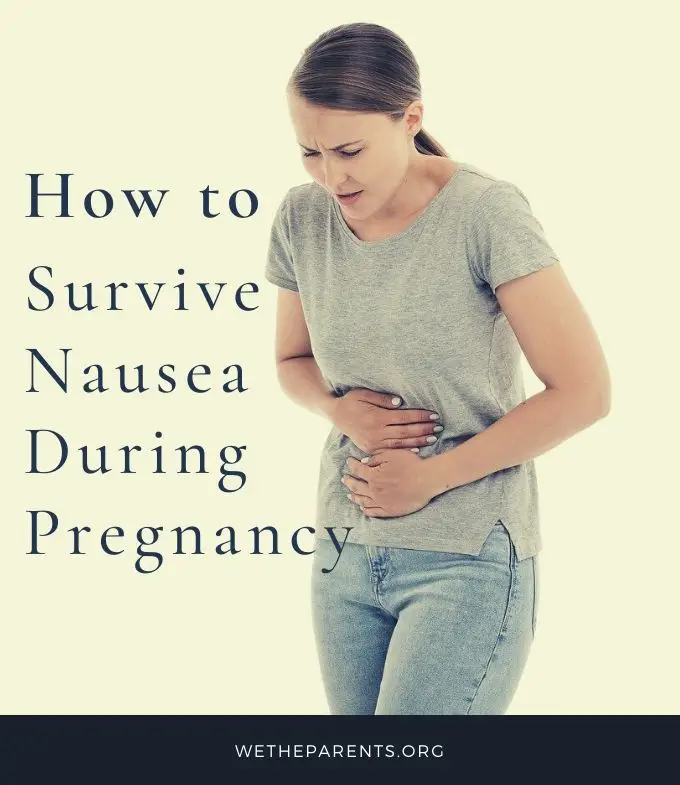How To Avoid Nausea And Morning Sickness
- If you feel sick first thing in the morning, give yourself time to get up slowly. If possible, eat something like dry toast or a plain biscuit before you get up.
- Get plenty of rest and sleep whenever you can. Feeling tired can make the sickness worse.
- Eat small amounts of food often rather than several large meals, but dont stop eating.
- Drink plenty of fluids.
- Ask those close to you for extra help and support.
- Distract yourself as much as you can. Often the nausea gets worse the more you think about it.
- Avoid foods and smells that make you feel worse. It helps if someone else can cook. If not, go for bland, non-greasy foods, such as baked potatoes, pasta and milk puddings, which are simple to prepare.
- Wear comfortable clothes. Tight waistbands can make you feel worse.
Home Remedies For Pregnancy Nausea
For some women, nausea is the first indicator that they might be pregnant and is what prompts them to schedule a doctors visit or a pregnancy test. Pregnancy nausea or morning sickness is not typically a dangerous condition, but it is aggravating and getting relief becomes a priority during its duration. Fortunately, your kitchen or bathroom medicine cabinet already provide plenty of home remedies for pregnancy nausea and well discuss 15 of those in this article.
Learn Who Gets Morning Sickness And When It Hits
Unfortunately, nausea and vomiting during pregnancy are quite common morning sickness affects somewhere around three-quarters of pregnant women. While some women are more likely to get it due to family history and other factors, scientists still havent pinned down its exact cause, though many experts think that it is connected to hormonal changes during pregnancy. One major pregnancy hormone in particular, called human chorionic gonadotropin , is widely thought to be the primary culprit women with higher levels of this hormone are more likely to get morning sickness .
According to experts, the most important risk factors for morning sickness include:
-
If you are pregnant with twins, triplets, etc.
-
If you had morning sickness during a previous pregnancy
-
If other women in your family had morning sickness
-
If you have a history of nausea and vomiting prior to pregnancy
Morning sickness usually starts early in a womans pregnancy, within the first nine weeks for almost everyone. Symptoms tend to peak around 10 weeks, and then usually subside by 14 to 16 weeks. For some women, nausea and vomiting might continue past that time. The timing is extremely variable, said Dr. Robert Silver, M.D., professor and chairman of obstetrics and gynecology at the University of Utah. However, if nausea and vomiting begin after nine weeks of pregnancy, let your doctor know so that she can consider other possible medical conditions.
You May Like: Can I Use Vagisil Cream While Pregnant
Who Is Likely To Develop Nausea
The women most likely to experience nausea during pregnancy are younger and having their first babies. Their mothers also likely had a rough time with morning sickness. It generally starts when women are five to six weeks pregnant and lasts about six weeks, although some lucky women feel nauseous through their entire pregnancy.
As for what causes the nausea, no one really knows for sure. It could be the bodys response to stress or hormone fluctuations due to pregnancy, the stretching of abdominal walls or the increase in progesterone which slows down gastric motility. Theres a heightened sense of smell which adds to the equation, and its also safe to say that women who already suffer from acid reflux are more likely to have severe nausea, vomiting and heartburn.
How Can I Manage Morning Sickness

Unfortunately, there is no magic cure for morning sickness. But there are some things that many people have found helpful. You could try:
- eating little and often eating 6 small meals a day instead of 3 big meals
- resting pregnancy sickness may feel worse when youre tired, so try to rest if youre not feeling well
- avoiding foods with lots of sugar or saturated fats this includes sweets, chocolate and red meat
- eating carbohydrates things like bread, rice, potatoes and pasta can be easier to eat when youre feeling nauseous
- keeping away from sickness triggers you may find that eating or even smelling certain food makes you feel sick
- having a small snack before getting up in the morning something like dry toast, crackers or a plain biscuit is great for lining your stomach before you begin your day
- having foods or drinks that have ginger in them there is some evidence that things like ginger biscuits, crystallised ginger or ginger tea can help you feel a little less queasy
- wearing plastic acupressure bands throughout the day these are available in most pharmacies and have a plastic button that presses on the acupressure point on the wrist, which may help reduce your nausea.
Recommended Reading: Is It Safe To Donate Plasma While Breastfeeding
Natural Remedies For Nausea And Vomiting During Pregnancy
If you are wondering what is good for nausea during pregnancy, here are 12 natural remedies that you can try:
Saltines
Keep some saltines at your bedside to eat right after waking up.
Salty, Sour & Cold Foods
Try salty, sour and cold foods and see if that helps. Many moms find that sucking on sour candies, popcicles or suckers can curb their nausea, at least long enough to get a few bites in.
Ginger
Steep some ginger in hot water to make a ginger tea to sip on. You can also get ginger-infused lollipops. Ginger is a known antinauseant and is safe to eat during pregnancy.
Protein
Eating foods that are high in protein at breakfast can help stabilize your blood sugar levels for the rest of the day.
Small, Frequent Meals
Im sure youve heard this before, but it warrants saying again. Try to eat small, frequent meals throughout the day this helps lower gastric secretions and will keep your blood sugar levels up.
Hydrate
You will want to drink to thirst to stay hydrated, as nausea can be worse if you are dehydrated. You may find that sipping on water between meals rather than during helps the most.
Avoid Smoking
Smoking can make nausea worse in two ways:
Mint
Fresh Air
Add Vitamin B6*
Review Your Iron Supplement*
Eat A Littleand Then A Little More
Many women find that grazing all day settles their stomach. “I call it the Six Meal Solution,” says Murkoff. “When your tummy is empty, the stomach acids have nothing to feast on but your stomach lining, compounding nausea. On the other hand, eating too much can overtax the digestive system, also leading to quease. Keeping your tummy a little bit full all day and all night is the best defense against morning sickness.”
Murkoff suggests keeping a snack stash nearby at all times. Nibbling a little bit before you get out of bed in the morning can stave off nausea, and a light bedtime snack will stabilize your blood sugar throughout the night. Eating small snacks throughout the day also enables you to keep some food in your stomach at all times.
Also Check: Can Pregnant Women Use Vagisil
My Personal Morning Sickness Experiences
For my first pregnancy I had morning sickness for exactly the first three months. Although it wasnt MORNING sickness, it was evening sickness. I would be fine all day until dinner, then throw up. It really wasnt all that terrible. Annoying, but pretty predictable and once I threw up Id feel ok again.
My second pregnancy was way more tough. The first 3 months I was nauseous all the time, but never threw up. Which seems to just make the nausea go on and on. Unless I chewed gum. For some reason the sweetness would put me right over the edge and would immediately be running to the bathroom to puke. And I have a massive gum chewing addiction, so that was a bit rough.
Then after a full trimester of relief, the nausea came back for my entire 3rd trimester! I didnt even know that was possible until I experienced it. But I found that it is actually quite normal to have 3rd trimester morning sickness.
My second pregnancy gave me the opportunity to try out all kinds of methods to ease nausea.
Even though you may not be able to completely eliminate nausea in pregnancy, it is so helpful to have multiple tools to relieve or reduce the debilitating symptom of nausea.
What Is Considered Severe Anemia In Pregnancy
Mild anemia corresponds to a level of hemoglobin concentration of 10.0-10.9 g/dl for pregnant women and children under age 5 and 10.0-11.9 g/dl for nonpregnant women. For all of the tested groups, moderate anemia corresponds to a level of 7.0-9.9 g/dl, while severe anemia corresponds to a level less than 7.0 g/dl.
Don’t Miss: Nutraburst While Pregnant
Eat Whatever You Can Whenever You Can
One of the reasons that morning sickness can be worse in the morning is that having an empty stomach tends to bring it on.
But when all the healthy food is gross, your stomach might be empty a lot.
So dont worry about nutrition, dont worry about calories. If you find something that you can eat, eat it. For weeks I stressed about nutrition. One day I spent half an hour forcing down a protein powder and fruit smoothie. It was SO awful. But I got it down.
And I kept it down for approx 3.5 minutes. Nutrition is extremely important during pregnancy, but surviving the nausea is just as important.
The day I discovered that I could eat potatoes was the best day. Any form of potatoes! And I could eat cold white food. Ice cream, plain yogurt, vanilla milkshakes. Those things were all ok.
I admitted to my doctor that I was eating nothing but potatoes and ice cream, expecting a lecture. I was SO relieved that he just laughed and assured me that my baby was more like a parasite than a pet, and it would take what it needed from me.
You will feel one hundred times less nauseous if you feed yourself SOMETHING. Beyond this wonderfully helpful advice Carly Campbell has lots more great advice for surviving the first trimester even beyond morning sickness.
What Is Morning Sickness
Morning sickness is nausea and vomiting that happens during pregnancy. More than half of pregnant women have nausea and vomiting, especially during the first trimester.
Despite its name, you can have morning sickness at any time of day. It doesn’t mean your baby is sick, and it doesn’t hurt the baby. Pregnancy nausea is probably caused by the sudden increase of hormones in your body. It’s usually mild and goes away about midway through your pregnancy. Some women never feel nauseated during their pregnancy.
Some women get a severe form of morning sickness called hyperemesis gravidarum. This happens when severe nausea and vomiting leads to dehydration or causes the woman to lose more than 5% of her pregnancy body weight. Sometimes, she may not get enough nutrients, leading to malnourishment. The woman may have to stay in the hospital to get fluids, medication, and rarely, a feeding tube.
Also Check: Side Effects Of Donating Plasma While Pregnant
When Does It Start
The nausea and vomiting that come with morning sickness usually begin early in a pregnancy, at around six weeks. Most people get relief from symptoms about three months into their pregnancy. However, some people have nausea that lasts the entire time.
Nausea and vomiting don’t always accompany each other. Some people with morning sickness only experience nausea, while others may only vomit.
Tips To Help Manage Morning Sickness

There is no one approach that will work for every woman with nausea and vomiting in pregnancy as each pregnancy is different.
Here is a list of some small changes you can make that may help to ease your symptoms:
In addition to trying to alleviate the symptoms of nausea and vomiting, dont forget to protect your tooth enamel if you are vomiting a lot. Try rinsing your mouth with a teaspoon of baking soda dissolved in a cup of water to help neutralize the acid produced by the vomiting.
Don’t Miss: Nutraburst Side Effects
+ Natural Ways To Curb Nausea During Pregnancy
Jan 15, 2020 | Pregnancy, Nutrition
Nausea is a very common early pregnancy symptom, affecting 8/10 expecting mothers. The severity and timing of pregnancy-induced nausea can fluctuate significantly based on a multitude of factors. While nausea during pregnancy is often also called morning sickness, pregnant women experience symptoms throughout the day and night. In many cases, nausea will resolve around 12 weeks, at the end of the first trimester. However, every pregnancy is different and there are cases of nausea that persist until delivery.
I have spoken with our teams prenatal dietitian Kristin Brown to tell us a bit more about common causes and natural remedies used to prevent nausea during pregnancy.
Tips To Manage Nausea And Vomiting
- Get as much rest as you can being tired can make nausea worse.
- Rinsing your mouth with water or mouthwash can help control unpleasant mouth taste that can make nausea worse.
- Ice chips and popsicles can help reduce the metallic taste in your mouth.
- Grated fresh ginger, ginger syrup or crystallized ginger added into hot water may help reduce your nausea.
- Talk to your doctor about taking just folic acid instead of your prenatal vitamin while you are feeling nauseated. Once you are feeling better, you can go back to taking your prenatal multivitamin.
You May Like: Is It Safe To Donate Plasma While Pregnant
What Causes Nausea In The 3rd Trimester
Heartburn is the most common cause of nausea in the 3 rd trimester. This problem occurs when the valve between the stomach and esophagus allows the acidic stomach contents to move back up the esophagus. Often called acid reflux, persistent heartburn can cause burns on the lining of the esophagus that can be a problem even after delivery.
Properly Plan What To Eat If You Have Nausea And Vomiting During Pregnancy
As youve seen, there are a number of optimal foods to eat when it comes to morning sickness. Keep in mind that this sensation is relatively frequent and doesnt necessarily indicate a serious health disorder. It simply responds to the hormonal and physiological changes that take place throughout this process.
Finally, remember that managing your diet correctly throughout pregnancy is very important to ensure the proper development of the fetus. Therefore, future illnesses in your baby related to metabolism or the composition of the intestinal microbiota can be prevented. However, if you have more questions about it, dont hesitate to consult a specialist.
You May Like: Donating Plasma While Breastfeeding
Nutrition For Nausea During Pregnancy
Nausea and vomiting symptoms are extremely common during the 1st three months of pregnancy due to changing hormones. The following are some suggestions to help with these symptoms.
Some women require prescription medication or hospitalization if symptoms are severe. Please feel free to call if vomiting is excessive.
The Myth Of Hysteria And Morning Sickness
Unrelenting morning sickness can have a profound effect on your quality of life, preventing you from working, socialising and looking after your other children.Pregnant women enduring morning sickness report higher levels of psychological stress, including anxiety and depression. This prompted the false belief that morning sickness is purely psychosomatic, which means that the womans fears and anxieties trigger her physical discomfort. However, there is no research to support these claims.
Don’t Miss: Braces While Pregnant
The Causes Of Nausea During Pregnancy
Pregnancy nausea is directly linked to the pregnancy hormone HCG, though the exact relationship is unclear. Early in pregnancy, when morning sickness is typically at its worst, HCG levels rise rapidly to help grow and nourish the fertilized egg.
Why Does This Happen
Besides the presence of HCG in the body, other things can cause nausea during pregnancy as well, including the following:
- An increase in estrogen.
- Low levels of vitamin B6.
- An aversion to a specific food.
Interestingly, studies show that mothers who experience nausea have a higher chance of a successful pregnancy . However, nausea isnt a surefire guarantee you wont miscarry.
How To Alleviate First Trimester Nausea Symptoms

There is good news and bad news concerning morning sickness. If you are suffering with it right now, the good news is doctors believe its a sign that the placenta is growing normally. The bad news, according to the Cleveland Clinic, is that although 70% of pregnant women get it early in the first trimester, the cause is not totally known. Whatever is causing it, here are some tips for how to alleviate first trimester nausea symptoms.
Also Check: Pregnancy Side Effects Week By Week

